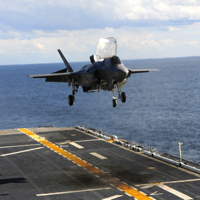On Jan. 5, Turkey’s Defense Industry Executive Committee, chaired by Prime Minister Recep Tayyip Erdogan, authorized the Undersecretariat for Defense Industries to open negotiations with Lockheed Martin for the purchase of two F-35 multi-role combat fighters by 2015. Though Turkey's defense minister today clarified that Turkey still intends to follow through with its intention to acquire 100 F-35s, the small initial purchase represents yet another setback for the troubled program.* It was followed by Britain’s declaration in February that it will postpone making any formal commitment to the F-35 until 2015. Australia, too, is currently reconsidering plans to buy 12 F-35s, and the F-35’s structural problems, which emerged during recent flight tests, led the U.S. Department of Defense to issue a technical report in December 2011 that recommended slowing down U.S. acquisitions as well.
But Ankara’s decision to move slowly on its F-35 purchase is not just driven by the project’s technical problems.* It also has to do with the United States’ uneasiness in sharing technology with Turkey, a problem dating back to the 1980s, when Turkey purchased its first F-16s. Turkey’s main interest is in acquiring software source codes for weapon systems, which the U.S. Congress has so far refused to share. In particular, Turkey wants control over the aircraft’s identification friend or foe (IFF) system in order to offer more flexibility with regard to how its fleet identifies foreign air force jets. The default setting of the original U.S. software for Turkey’s F-16 fleet, for instance, identified Israeli air force jets as exclusively friendly. To overcome the problem, ASELSAN, one of Turkey’s leading defense companies, developed a new IFF system, which was finalized in September 2011 and is now operational on Turkey’s F-16 fleet. The new system allows Turkish fighters to bypass the original software restrictions, allowing Turkish pilots to determine whether to recognize Israeli fighters as either friendly or hostile.
In other words, the F-35 decision and the broader technology-sharing issue must be seen in the context of Turkey’s military credibility vis-à-vis Israel and the rest of the Middle East. Since the Gaza flotilla incident in 2010, the diplomatic distance between Israel and Turkey has grown exponentially, and relations have not shown any sign of improving. In December 2011, the Israeli government vetoed a deal that Israeli defense firm Elbit Systems signed with Turkey for the provision of reconnaissance and radar systems. That decision came just a few months after Erdogan had declared that he wanted all military and defense ties with Israel suspended. Tensions have grown even more since January, when Israel signed an agreement on defense cooperation with Cyprus -- much to Turkey’s displeasure, given ongoing friction over the exploitation of offshore gas reserves in disputed territorial waters.

